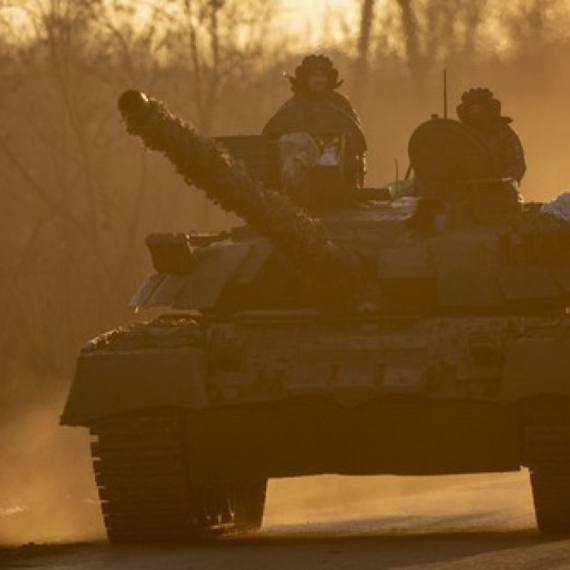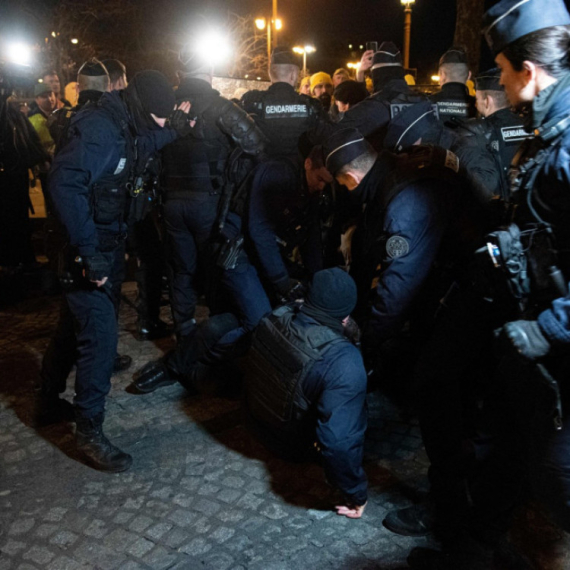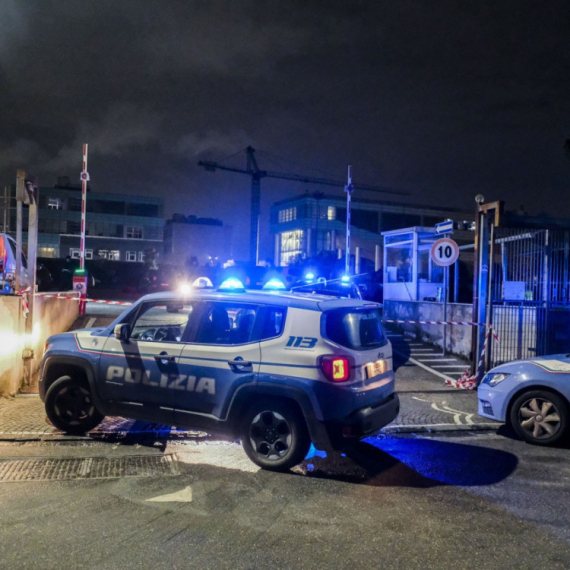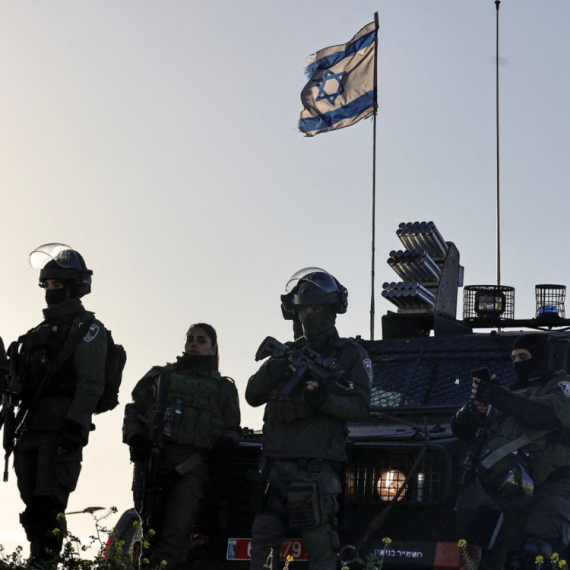U.S. defense secretary considers halting troop cuts in Iraq
U.S. Defense Secretary Robert Gates has called for a temporary halt to troop withdrawals from Iraq.
Monday, 11.02.2008.
13:17

U.S. Defense Secretary Robert Gates has called for a temporary halt to troop withdrawals from Iraq. Gates said in Baghdad on Monday that he was in favor of a short pause in troop drawdowns after about 30,000 American troops have been sent home by July. U.S. defense secretary considers halting troop cuts in Iraq Gates said the security situation in Baghdad remained "fragile," a comment echoed on the streets of the capital which was rocked by two car bombings that left three people dead just as he was winding up his surprise trip to Iraq. "I think that the notion of a brief period of consolidation and evaluation probably does make sense," he told reporters after a two-hour meeting with U.S. commander in Iraq General David Petraeus. "I must say, in my own thinking, I am headed in that direction as well but one of the keys is how long is that period and what happens after that. It still has to be determined and decided by the president." The 157,000-strong U.S. force in the insurgency-wracked country is currently on track to come down from 19 brigades to 15 by July, a reduction of at least 20,000 troops plus another 7000 to 10,000 members of support units, according to military commanders in Iraq. Gates has previously expressed hope that the drawdown can continue to about 10 brigades or about 100,000 troops at year's end. Petraeus is supposed to make recommendations in April on U.S. force levels for the second half of the year. Last month he suggested in an interview with CNN that he will ask for a pause in the drawdown to assess whether security can be maintained with fewer troops. It is not clear how long a pause Petraeus has in mind, but reports have varied from 30 to 90 days. "I had a good meeting with General Petraeus; we met for about two hours talking about his evaluation, I feel a lot smarter now," said Gates, on his seventh visit to Iraq. "We have a process in place, as we indicated before General Petraeus will make his recommendations in March to the president and Central Command and the Joint Chiefs will make their recommendation and I will make my recommendation." Gates arrived in Iraq shortly before the one-year anniversary of a US troop surge designed to improve security in Baghdad, although the country continues to battle a deadly insurgency. On Monday, two car bombs exploded almost simultaneously in the southern Baghdad neighborhood of Jadriyah, killing at least three people and wounding six. Gates was greeted on his arrival on Sunday by a powerful car bomb triggered by a suicide attacker that killed 25 people at a market in the village of Yathreb near Balad, north of Baghdad. "The situation in Iraq continues to remain fragile," said Gates, on a visit to assess the security and political situation in the country almost five years after the US-led invasion that toppled Saddam Hussein. Gates met Iraqi leaders on Sunday night over dinner hosted by Petraeus. "(We had) a wide ranging conversation about legislation under way, about the status of forces agreement, about successes that have been enjoyed here," he said. Discussions centred on the fate of a stalled gas and oil law and the recent adoption of a controversial reconciliation law which allows members of Saddam's former Baath party to return to public life. Gates had said before the meeting he would discuss "the prospects for further success", in particular a proposed provincial powers law which would give more autonomy to the regions. Last week, Gates said the United States would make no commitments to the defense of Iraq in the Status of Forces Agreement that Washington is discussing with the Baghdad government. In an interview on Sunday, U.S. President George W. Bush acknowledged the United States would seek a military presence in Iraq for "years" but pledged he would not establish permanent bases. The status of forces agreement would replace a UN Security Council resolution which validates the U.S. military presence in Iraq but which expires on December 31.
U.S. defense secretary considers halting troop cuts in Iraq
Gates said the security situation in Baghdad remained "fragile," a comment echoed on the streets of the capital which was rocked by two car bombings that left three people dead just as he was winding up his surprise trip to Iraq."I think that the notion of a brief period of consolidation and evaluation probably does make sense," he told reporters after a two-hour meeting with U.S. commander in Iraq General David Petraeus.
"I must say, in my own thinking, I am headed in that direction as well but one of the keys is how long is that period and what happens after that. It still has to be determined and decided by the president."
The 157,000-strong U.S. force in the insurgency-wracked country is currently on track to come down from 19 brigades to 15 by July, a reduction of at least 20,000 troops plus another 7000 to 10,000 members of support units, according to military commanders in Iraq.
Gates has previously expressed hope that the drawdown can continue to about 10 brigades or about 100,000 troops at year's end.
Petraeus is supposed to make recommendations in April on U.S. force levels for the second half of the year. Last month he suggested in an interview with CNN that he will ask for a pause in the drawdown to assess whether security can be maintained with fewer troops.
It is not clear how long a pause Petraeus has in mind, but reports have varied from 30 to 90 days.
"I had a good meeting with General Petraeus; we met for about two hours talking about his evaluation, I feel a lot smarter now," said Gates, on his seventh visit to Iraq.
"We have a process in place, as we indicated before General Petraeus will make his recommendations in March to the president and Central Command and the Joint Chiefs will make their recommendation and I will make my recommendation."
Gates arrived in Iraq shortly before the one-year anniversary of a US troop surge designed to improve security in Baghdad, although the country continues to battle a deadly insurgency.
On Monday, two car bombs exploded almost simultaneously in the southern Baghdad neighborhood of Jadriyah, killing at least three people and wounding six.
Gates was greeted on his arrival on Sunday by a powerful car bomb triggered by a suicide attacker that killed 25 people at a market in the village of Yathreb near Balad, north of Baghdad.
"The situation in Iraq continues to remain fragile," said Gates, on a visit to assess the security and political situation in the country almost five years after the US-led invasion that toppled Saddam Hussein.
Gates met Iraqi leaders on Sunday night over dinner hosted by Petraeus.
"(We had) a wide ranging conversation about legislation under way, about the status of forces agreement, about successes that have been enjoyed here," he said.
Discussions centred on the fate of a stalled gas and oil law and the recent adoption of a controversial reconciliation law which allows members of Saddam's former Baath party to return to public life.
Gates had said before the meeting he would discuss "the prospects for further success", in particular a proposed provincial powers law which would give more autonomy to the regions.
Last week, Gates said the United States would make no commitments to the defense of Iraq in the Status of Forces Agreement that Washington is discussing with the Baghdad government.
In an interview on Sunday, U.S. President George W. Bush acknowledged the United States would seek a military presence in Iraq for "years" but pledged he would not establish permanent bases.
The status of forces agreement would replace a UN Security Council resolution which validates the U.S. military presence in Iraq but which expires on December 31.



























































Komentari 0